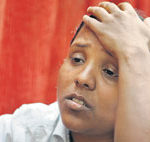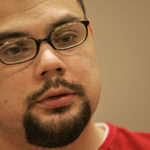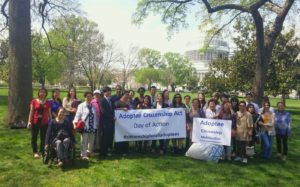Bastard Nation Analysis and Endorsement of
The Adoptee Citizenship Act of 2015
This report will be updated when appropriate.
A shorter bullet point version of this report is here [2]
Until 2000 children adopted internationally by a US citizen were required to undergo a naturalization process prescribed by US law. Depending on the type of visa the child traveled under to enter the US, some were granted automatic citizenship while others gained citizenship only after their adoptive parents “re-adopted” them in the US following procedures outlined by federal and individual state law.
Unfortunately, many adoptive parents did not check citizenship status at the time of adoption or follow through on the citizenship process. Some say they were unaware of naturalization requirements and believed citizenship was automatic upon adoption finalization. Some claim to have been misled by their adoption agencies, courts, lawyers, or federal immigration authorities. Some believed that it was up to the adoptee, at the age of majority, to choose their citizenship status. In some cases adoptive parents disrupted the adoption, and either “rehomed” the children they brought to the US or turned them over to the state foster care system where they lingered with no legal closure.
Decades later these misunderstandings and failures led to legal problems—including deportation proceedings– for international adoptees years after their adoptions were were assumed “finalized” and citizenship granted. Most of these adoptees had no idea that they were not US citizens until they attempted something as simple as registering to vote or were convicted of minor crimes—even misdemeanors—and fell under the gaze of government authorities.
The passage of the federal Child Citizenship Act of 2000 [3] (text [4]) (CCA) attempted to remedy this situation by granting automatic citizenship to those 21 and younger adopted internationally on or after February 27, 2000, the effective date of the legislation.
Those adopted before that date were left behind, subject to federal investigation and possible deportation under the old system. The situation became worse after 9/11 when legal identity and proof of citizenship came under critical scrutiny by federal, state, and local governments. Since then, the number of international adoptees deported or in the deportation pipeline has grown dramatically Most have been convicted of minor non-violent offenses particularly controlled substance possession; others reportedly investigated and threatened with deportation for simply applying for a Pell Grant or Social Security benefits. One absurd case involved German adoptee, Mary Anne Gehris [5], an administrative assistant and mother of two in Covington, Georgia, who in 1998 applied for citizenship so she could vote and accept scholarship money. She admitted on her application that ten years earlier she had been convicted of misdemeanor battery for pulling a woman’s hair during a “spat” over a boyfriend, and had done a year’s probation, and community service time. She avoided deportation when the Georgia Board of Pardons and Parole granted her a pardon to keep her in the US. She became a US citizen in 2001.
The federal government keeps no statistics on the number of deported adoptees or how many adoptees are in the US without US citizenship. We are therefore forced to rely on media reports on individual deportation cases. The most complete documentation is located on the website of the adoption watchdog Pound Pup Legacy [6]. Researchers however, say that the number of “illegal adoptees” can go as high as 15,000 [7]. Many probably are not aware of their “illegal” status and some may not even know they are adopted. To make matters worse, those who learn they aren’t citizens are fearful of coming forward to apply for citizenship because under the Immigration and Nationality Act of 1996 [8]they can be charged as undocumented by INS/ICE and subject to deportation, The law gives judges little discretion to stay deportations.
Currently, America’s “illegal adoptees” cannot gain permanent resident status. They cannot legally hold jobs or driver licenses or register vehicles, open bank accounts, join the military, receive security clearances, apply for US passports, or receive any number of government entitlements or funds—including Social Security which they or their or their spouses have paid in to.
 [9]
[9]What we do know is that the majority of adoptee deportees are Asian and Latino, most adopted as infants or toddlers by white parents, some military. Some deportees, such as Rudi Richards/Udo Ackerman [10] (Germany) and Monte Haimes/Ho-Kyu-Han [11] (Korea) in fact, are veterans whose status wasn’t flagged when they enlisted in the military. A number of deportees, such as Adam Crapser (Korea) and Jennifer Haynes [12](India) were victims of child physical and sexual abuse, disrupted adoptions, and abusive foster care.
Adoptee deportees have little or no memory of their countries of origin. They have no native-language skills, and no family, friends, or support system in their first countries. Most have no means of employment in their original countries due not only to those limitations but because those governments severed citizenship when the child was adopted to the US. News reports indicate that deported adoptees often end up in homeless shelters and the streets—or worse– when returned to their countries of origin.
- Joao Herbert [13] adopted from Brazil at the age of 8 and deported after a misdemeanor marijuana charge for which he performed community service. Two years later he was murdered in the poor suburb in which he lived outside of Rio.
-
 [14]
[14]Jennifer Edgell Hayes deported to India. Adopted without parental consent. Original adoptive father sexually abused her; abuse continued in second adoption family. Shipped to 50 foster homes in 10 years. Jennifer Edgell Haynes [12] born in Mumbai, India in 1981, was left in the custodial care of an orphanage when she was 5 years old. At the age of 8 she was adopted, without the consent of either parent, by an American couple. Her new father sexually abused her, and she was removed from the family and placed in a second family, where she was again sexually abused. In less than a 10-year period, Jennifer was passed around to nearly 50 foster homes. Neither adoptive family nor her adoption agency (Americans for International Aid and Adoption [15]) completed her citizenship process She was deported to India in 2008 after serving time for drug possession. She is married to an American citizen and left two children behind in the US. Her case has wended its way through Indian courts. In the meantime, she is unable to work in India due her unresolved citizenship status and reportedly has been living in shelters.
- Alejandro Ebron [16] was deported to Japan after a series of drug possession convictions and a shoplifting charge. He was adopted in 1959 at the age of 1, by a US sailor stationed in Yokohama and his Filipino wife. Two years later the US Immigration and Naturalization Service canceled Alejandro’s citizenship hearing because his adoptive father was at sea with the US Navy and unavailable to attend. Ebron’s adoptive father was in Vietnam until around 1970, and his adoptive mother, who was seriously ill, didn’t continue the citizenship process. Ebron says he always believed that he was half Mexican and half Filipino. He assumed he would be deported to Mexico, He was stunned when he was sent to Japan.
-
 [17]
[17]Jess Mustanich, deported to El Salvador. Adoption agency went out of business and US authorities stonewalled naturalization. Nearly ten years ago, Jess Mustanich [18] was deported to his native but unknown El Salvador after he was convicted of burglary when he and some friends broke into his adoptive father’s home. In 2005 Jess’s adoptive father, Bill Mustanich, told the San Diego Union Times that he and his lawyer ran into problems 15 years earlier when Jess was 5 and he tried to re-adopt him under the then-law. (The Mustanichs had just concluded a protracted divorce and custody battle and Bill had been granted full custody of Jess while his ex-wife got custody of two adopted girls.)The unnamed agency that helped handle the adoption closed and laws changed. The elder Mustanich says he was stonewalled by Immigration & Naturalization as well. An INS clerk refused to accept the required re-adoption application and gave him an INS phone number to call instead. Bill said he left several messages but never received a response. As Jess grew older he began to exhibit psychological problems and ended up in residential treatment and state care since according to the law, the Bill Mustanich, though he had repeatedly requested court help with the adoption procedure, had no legal authority over Jess. Upon release from San Quentin in 2003 on the burglary charge Jess was transferred to an ICE detention center where he was stripped of his American and Mustanich identity and referred to as Alfaro, the last name of the birth mother he never knew. Bill Mustanich says, “I think what the government has tried to do is strip him of his American Anglo identity, I think they have taken Mustanich away because they don’t want a Mustanich being deported to El Salvador. What a horrible thing it would look like if he turned up dead.” Jess was deported in 2008. Last reports indicate he was learning Spanish, receiving financial assistance from Bill and from Salvadorian Seventh Day Adventists.
 [19]
[19]Anissa Druesedow de Thelwel [20]was born in Jamaica in 1970, When she was 6 her biological mother took her and her sister to Panama to live where she was sexually abused by her mother’s boyfriends and family members. Later when her mother abandoned the siblings to their grandfather, he put them in an orphanage where the abuse continued. In 1982 Anissa and her sister were adopted by an American couple stationed at the military base in Panama City. Six years later, back in the States, she was diagnosed with cancer and her left leg was amputated. When she turned 18 military insurance expired and as a “walking medical bill” her adoptive parents let her know she’d out-stayed her welcome. By 2003, Anissa was a single mother holding down dead-end jobs with an ex-husband who refused to pay child support. She was convicted of Grand Theft (no details) and sentenced to at least one year in prison. During prison processing ICE informed her she had not been naturalized; therefore not a US citizen. Federal authorities put a hold on her keeping her from participating in the work-release program or resuming her old job which her former employer had promised her. Her adoptive parents said she’d broken the law and refused to help. In 2006 Anissa was deported to Jamaica where authorities, although the government had accepted her, did not believe she was Jamaican and didn’t want her. She made her way to Panama where she has re-married and now lives. Anissa volunteers at local orphanages, including the one she lived in as a child, works as a translator, and is active in internet adoption forums and the ACA campaign. She hopes to be allowed to return to the US.
 [21]
[21]At least one documented US citizen has been deported. North Carolina-born and adopted Mark Lyttle [22], (also here [23]) was shipped off to Mexico after serving time for assault. Lyttle has a history of mental illness. He attested alienage (but also made contradictory statements) to ICE which took his word over FBI records that indicated US birth and citizenship. Besides, he “looked Mexican.” (Lyttle’s biological father is part Puerto Rican) ” Lyttle returned to the US after Mexico deported him to Honduras and Honduras sent him to Guatemala (and perhaps Nicaragua) where he was able to connect with the US Counsel who cleared the way for him to return to the US in a matter of hours. Upon arrival, however, ICE attempted to deport him again, but finally OK’d his release after pressure from his lawyer. Lyttle successfully sued ICE, which admitted no wrongdoing and was awarded an unspecified settlement.
Two new deportation cases have recently been publicized.
 [24]
[24]- Susan Hill [25] (here [26] and here [27]) now going by her original name Viviana Isobel Diaz-Henao, is one of a sibling group of five adopted from Medelin, Columbia in 1989 by a couple in Virginia who had already adopted 9 children internationally. She was 6 years old. Susan had a problematic relationship with her new family, ran away eventually, and stayed with family friends and in group homes. As a teenager, she served time on a drug charge and was convicted of small non-violent crimes. When she was caught driving without a license, she signed her sister’s name to the ticket, which triggered an investigation, and landed her in the deportation tank for forgery. Susan was legally adopted, but unlike her siblings, she was never naturalized. Her adoptive parents now say they were “too busy” with 14 children to complete the process. Her siblings believe they just wanted to get rid of her. She was deported in 2012 and until late last year lived in Medelin where she located her birthmother and taught English. In late 2015 Susan, in an attempt to reunite with her 7-year old son she hadn’t seen since he was 3 months old, was apprehended at the border when she attempted to enter the country. ICE has agreed to reopen her case. [28] She is currently held at a federal prison in Houston Texas and working with Nexus Services [29] to regain legal status. She is in the process of applying for two separate visas for victims of human trafficking and abuse
-
 [30]
[30]Ella Purkiss adopted in Korea in the 1950s; still in US while case is reviewed. An electrician holding security clearances to work in nuclear power plants and military bases. Learned she was not a citizen when she applied for her husband’s Social Security Survivors Benefits. Ella Purkis [7], adopted from Korea in 1956 at the age of 2, is an electrician with security clearances to work on military bases and in nuclear plants. In 2012 her husband became seriously ill and she was forced to stop working to care for him. After his death, she attempted to file for her husband’s Social Security Survivor’s Benefits. Ella was informed that she was not a US citizen and advised to apply for a US Certificate of Citizenship. Her request was rejected because she was over the age of 18 and told that her adoptive parents couldn’t “transfer their citizenship” to her. Due to a US Senator’s intervention Ella has received a temporary Green Card due to be renewed in 2017 and is now collecting benefits, Her citizenship status remains unresolved. Update: shortly after this was published we learned that Ella’s citizenship application has been approved [31], and will be granted on July 8, 2016
######
Since the passage of ACA 2000 attempts have been made to close the pre-2000 “loophole,” but have met with resistance even by members of Congress who “get it.” In general, international adoption has been caught in the crosshairs of current and proposed immigration policy and controversy. A major stumbling block has been a concern over a “pathway to citizenship” for those convicted of crimes and deported to their country of origin
In 2015 US. Sens. Amy Klobuchar, (D-Minnesota), and Jeff Merkley, (D-Oregon) introduced S2275, The Adoptee Citizenship Act of 2015 [32] (ACA) an amendment to the Child Citizenship Act of 2000. Recently Rep. Adam Smith (D-Washington) introduced HB 5454, the companion bill [33] in the House. The House bill is slightly different in that it clarifies confusing language in the Senate bill covering background check provisions regarding resolution and adjudication of criminal proceedings that led to deportation or in some cases voluntary exit from the US due to “illegal” status.
The bill if passed will retroactively grant citizenship to all adoptees who did not fall under the original bill. To settle concerns over a “pathway to citizenship,” the bill requires that the sentences of those deported be served in full before citizenship is considered.
As before, ACA has become a hard-sell with adoptee citizenship being conflated with immigration controversies. Reportedly some conservative legislators who actually supported earlier attempts to amend the original bill are hesitant to step forward for fear of being perceived as ‘pro-immigration.” The ACA they say, can be the camel’s nose under the tent regarding immigration loopholes even though international adoption is not an immigration issue and is, in fact, deeply promoted by US foreign policy.
Currently S2275 the is in the Senate Judiciary Committee chaired by Oren Hatch (R-Utah) It has only a handful of Senate sponsors. The House companion HB5454 is in the House Judiciary Committee. No action can be taken on the ACA in either house until enough sponsors are recruited in each chamber, appropriate Senate and House chairs are convinced to release the bill for hearings and a committee vote and then sent on for floor for passage. Lack of interest, along with upcoming presidential election and the failure of either house to move on stand-alone bills in general, has slowed down the ACA leaving the citizenship and rights of thousands of US cross-country adoptees in limbo.
So far, two Adoptee Citizenship Act Days [34] ( April 19, 2016, and June 14, 2016) have been held in Washington, DC. Sponsored by the National Korean American Service and Education Consortium (NAKASEC), 18 Million Rising, Gazillion Strong, the Adoptee Rights Campaign (ARC) and the Korean American Coalition, activists and allies from across the country have met on Capitol Hill with members of the House and Senate to press for passage. Activities have included press conferences featuring adoptees who do not hold US citizenship, one-on-one lobbying with lawmakers and aides, and a call-in for activists who could not attend the events in person.
 [35]
[35]
######
Bastard Nation supports the Adoptee Citizenship Act 2015, the amendment to the Child Citizenship Act of 2000. We believe:
- All US adoptees, adopted domestically and internationally, should be treated equal and fair under law.
- All individuals adopted by US citizens should enjoy the same citizenship rights and responsibilities as American-born individuals. Their finalized adoption makes internationally adopted individuals the legal children of their American and legal adoptive parents.
- No one adopted by a US citizen in a cross-country adoption should be denied US citizenship due to their date of adoption. Under the current segregated system (mirrored in most states by OBC access regulations) some adult adoptees enjoy full citizenship rights and responsibilities, while others are forced to either hide their status and live in fear or come forward, undergo cumbersome and unnecessary citizenship requirements and paperwork—and possibly set themselves up for investigation and under certain circumstances deportation to their country of origin—to enjoy those same rights and responsibilities.
- Adoptees were entitled to citizenship before their crimes or other miscues were committed. Commission or conviction of a crime does not supersede their adoption.
- International child adoption is not an immigration issue.
- US international adoptees had no say regarding their adoption and entry to the US. Their adoptions were facilitated by a network of adoption providers, professionals and US government agencies including the US State Department. They lack US citizenship through no fault of their own and should not be punished due to the negligence and lack of due diligence on the part of their adoptive parents, adoption professionals, or US immigration authorities.
- US international adoptees, should not be kept from grasping their citizenship rights due to fear of federal immigration retaliation if they come forward and attempt to apply for citizenship.
- The US, as a signatory to the Hague Convention on Intercountry Adoption, is obligated to extend all rights and privileges to its international adoptees.
- The deportation of adult adoptees controverts the belief that adoption is “forever,” and that adoptees are truly the children of those who adopt them. Deportation gives a black eye to US international adoption policy and sends a strong message to sending countries that adoption is temporary and subject to bureaucratic whim.
- For over 70 years US government policy has encouraged and facilitated cross-country adoption, yet without the protection of ACA, pre-2000 adoptees are disenfranchised from the country and adoption that embraced them.
Bastard Nation is working to secure sponsorship and support from Senate and House members. In addition to Klobuchar and Merkley, current Senate co-sponsors are Senators Dan Coates (R-Indiana), Kristen Gillibrand (D-New York) Brian Schatz (D-Hawai’i), and Mazie Hironi (D-Hawai’i). House sponsors are Adam Smith (D-Washington) and Trent Franks (R-Arizona). We urge individuals and organizations to contact [36]their US Representatives and Senators to push for sponsorship and support and groups to endorse it.
ACA 2015 is endorsed by Bastard Nation and a wide range of adoptee rights and adoption advocacy organizations:
- 18 Million Rising
- Adoptee Rights Campaign
- Adoption Solidarity Korea – LA
- Adoption Museum Project
- Adoption Today and Fostering Families Today magazines
- Adult Korean Adoptees of Portland
- American Academy of Adoption Attorneys
- Bethany Christian Services
- Bully Creative Shop
- The German Cultural Society
- Black German & Research Association
- Catalyst Foundation
- Center for Adoption Policy
- Christian Alliance for Orphans
- Donaldson Adoption Institute
- Equality for Adopted Children
- Ethiopian Adoptees of the Diaspora
- Families with Children from Asia
- Families with Children from Asia – Midwest
- Focus on the Family
- G I Babies of Germany
- Gazillion Strong
- Gladney Center for Adoption
- Holt International Children’s Services
- Hope for Orphans
- Korean Adoptee Italian Organization
- The Korean American Bar Association
- Korean American Coalition
- Korean American Story
- Land of Gazillion Adoptees (LGA)
- National Center on Adoption and Permanency
- National Council for Adoption
- National Korean American Service & Education Consortium
- Parents for Ethical Adoption Reform (PAIR)
- Pollen
- The Research Center for Korean Community at Queens College
- Truth and Reconciliation for the Adoption Community of Korea
- Show Hope
- Washington Adoption Reunion Movement
The United States is not alone in attempting to de-citizen its international adoptees. Recently the Australian Department of Immigration and Border Protection said that amended Australian birth certificates, issued as part of the adoption process, are no longer lawful evidence of citizenship [37] leaving the citizenship of thousands of internationally adopted Australians in limbo and at best forced to apply for the citizenship they believe they already hold.
Selected Resources
Contacting Congress Directory [36]
S2275 [32]
HB5454 [33]
Gazillion Strong [38]
Land of Gazillion Adoptees [39]
Korean American Association [40]
Pound Pup Legacy Deportation Cases [41]
National Korean American Service & Education Consortium [42]
Written by Marley Greiner with assistance from Shea Grimm
Published July 1, 2016
©2016. Bastard Nation: The Adoptee Rights Organization
www.bastards.org
